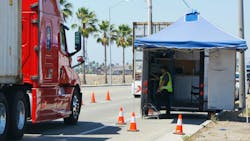EPA calls Cali's Clean Truck Check unconstitutional
Operators of out-of-state and out-of-country heavy-duty vehicles will get a break in California if a new proposal by the U.S. Environmental Protection Agency is implemented. The proposal would exempt non-native trucks and buses from the state’s Heavy-Duty (HD) Inspection and Maintenance (I/M) Requirements, or commonly known as the Clean Truck Check program.
Clean Truck Check calls for all diesel and alt-fuel trucks over 14,000 lb. GVWR, even ones not registered there, to get a diagnostic test to verify they aren’t heavy polluters. This violates the U.S. Constitution’s Commerce Clause as well as Section 110 of the Clean Air Act, the EPA said. Another issue is that foreign vehicles fall under the purview of Federal government, not individual states.
Once published in the Federal Register, the proposed rule will have a 30-day public comment period.
What is Clean Truck Check?
The HD I/M screenings started in 2024 to identify any poorly maintained, high-emitting trucks and ensure they are repaired. It’s essentially looking to weed out old trucks that contribute more than their fair share of NOx and carcinogenic toxic air pollution to the Golden State’s skies.
Read more: How to prep for California's Clean Truck Check program
The overall goal is to reach federal air quality standards and improve public health, “especially in disadvantaged communities disproportionately impacted by air pollution,” according to guidance released by California Air Resources Board.
This is done with a diagnostic scan through the OBD port. Vehicles pre-dating OBD go through a smoke opacity test.
Even hybrids, privately owned vehicles, and government vehicles must go through the check.
Exempt trucks and buses include: Zero-emission vehicles, military and emergency vehicles, historical vehicles, and newer trucks that meet the most stringent NOx standards.
Owners of eligible vehicles must register online, pay an annual compliance fee, and submit to bi-annual checks. After three years in the program, vehicles must get checked four times a year.
Emissions tampering and failure to comply or make repairs can result in blocked registration and fines.
EPA’s assault on CARB
This move would partially approve and partially disapprove the maintenance and inspection requirements, and by doing so re-establish federal authority in California. EPA Administrator Lee Zeldin likened California’s strict emission rules as a “power grab."
He added the current EPA “will not sit idly by while, in the name of climate change, they raise the cost of living on all Americans who rely on truck drivers and the products they deliver across the country.”
The EPA release also accused California of trying “to drive out affordable trucks and products based on an extreme climate ideology.”
This is just the latest in a long legal conflict between the EPA and CARB. Earlier in the year, Congress voted to use the Congressional Review Act to remove CARB’s Clean Air Act preemptive waivers that authorized California to legally enforce three regulations: Advanced Clean Cars II, Advanced Clean Trucks, and Heavy-Duty Engine Omnibus NOx.
President Trump signed the resolutions in June.
“These waivers would have raised costs, restricted consumer choice, and strained the electric grid,” the EPA reiterated in the release announcing the proposal to change Clean Truck Check.
In August, the Department of Justice filed two complaints in federal courts to stop CARB from holding truck and engine manufacturers to the terms of these defunct regulations. Those OEMs signed an agreement called the Clean Truck Partnership in 2023 that said the signatories would follow certain regulations regardless of federal standing. This means they would have to manufacture a certain amount of new ZEVs for the state. The number would increase every year based on the vehicle class and type. Sales of new vehicles with internal combustion engines would ultimately be prohibited in the state.
Four of the heavy-duty truck manufacturers that entered the CTP— Daimler Truck North America, International, Paccar, and Volvo Group North America—also sued California for trying to enforce the deal.
To make matters more complicated, the EPA is in the process of removing greenhouse gas regulations related to the 2009 Endangerment Finding, a report that says GHGs are a threat to public health. The EPA argues there is legal justification to dismiss the finding, though CARB and many other organizations vehemently disagree. This proposed rule is currently in the public comment period. The ultimate fate of the finding and subsequent GHG rules are expected to be settled in the Supreme Court.
About the Author

John Hitch
Editor-in-chief, Fleet Maintenance
John Hitch is the award-winning editor-in-chief of Fleet Maintenance, where his mission is to provide maintenance leaders and technicians with the the latest information on tools, strategies, and best practices to keep their fleets' commercial vehicles moving.
He is based out of Cleveland, Ohio, and has worked in the B2B journalism space for more than a decade. Hitch was previously senior editor for FleetOwner and before that was technology editor for IndustryWeek and and managing editor of New Equipment Digest.
Hitch graduated from Kent State University and was editor of the student magazine The Burr in 2009.
The former sonar technician served honorably aboard the fast-attack submarine USS Oklahoma City (SSN-723), where he participated in counter-drug ops, an under-ice expedition, and other missions he's not allowed to talk about for several more decades.
